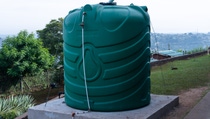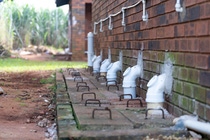Media
Empowering Education Through Hygiene and Hope: The Life, Dignity and Health Project at Zuzumqele High School


Access to clean Water, Sanitation and Hygiene (WASH) is not just a basic need — it is a human right that supports dignity, health, and access to education. In schools, especially those located in under-resourced communities, WASH infrastructure is essential to creating safe and healthy learning environments.
At Zuzumqele High School in Ezimbokodweni, KwaZulu-Natal, this right was severely compromised. With only eight out of 24 toilets functional, damaged infrastructure, and frequent water shortages, learners — especially females — were reluctant to use the facilities. Caretakers, in turn, were challenged by the poor hygiene conditions, exacerbated by low water pressure and the presence of maggots in the ablution blocks. The situation posed a serious health risk to both learners and staff.
Recognising the urgency of the matter, our BASF Dispersions Sub-Saharan Africa Site team stepped in with the Life, Dignity and Health Project, a targeted intervention aimed at transforming the school’s sanitation and absolution conditions. The project focused not only on infrastructure upgrades but also on hygiene education and long-term sustainability.
Project Objectives and Impact:
The primary goal was to restore dignity and improve the overall well-being of learners and educators through access to clean and functional sanitation facilities. With 401 learners (201 of whom are female) and 25 educators, Zuzumqele High School serves a community deeply affected by poverty, making the launch of this initiative both timely and essential.
Key Project Highlights:
To ensure water supply resilience, two 5000-litre bulk water tanks equipped with pumps were installed at the school. This upgrade guarantees a consistent water supply for flushing toilets and handwashing, even during frequent municipal water disruptions. It provides a crucial safeguard against water shortages, which had previously left learners and educators without access to basic hygiene.
The school’s infrastructure also underwent significant refurbishment. Damaged water reticulation pipes were replaced, and the ablution blocks were fully upgraded. These improvements included retiling the floors, repainting walls, repairing or replacing broken doors and windows, and installing a new concrete wash-through to enhance functionality and cleanliness.
To improve hygiene and sanitary conditions, sanitary pad disposal bins and essential cleaning consumables were provided. In addition, caretakers received training to equip them with the knowledge and skills necessary to maintain the cleanliness and hygiene of the upgraded facilities on a daily basis.
As part of the WASH (Water, Sanitation and Hygiene) education and awareness component, tailored guidelines were developed and shared with the school. Hygiene awareness sessions were conducted for learners, educators, and caretakers to reinforce proper sanitation practices. These sessions also focused on the impact of vandalism and the importance of maintaining the new infrastructure to ensure long-term sustainability and safe learning environments.
This initiative was more than a renovation project — it was a commitment to ensuring learners can focus on their education without the burden of poor hygiene or inadequate facilities. Furthermore, it marked progress toward educational equity, ensuring that every child—regardless of their socio-economic circumstances—can learn in a safe, clean, and dignified school environment.
The successful handover of the ablution upgrade on May, 19 2025. marks a new chapter for Zuzumqele High School, its learners, and the broader Ezimbokodweni community.
A heartfelt thank you goes out to all stakeholders, partners, and team members who made this transformation possible. At BASF, we remain committed to enabling healthier, more sustainable communities — one school at a time.
<<< NEWS REFERENCE >>>
